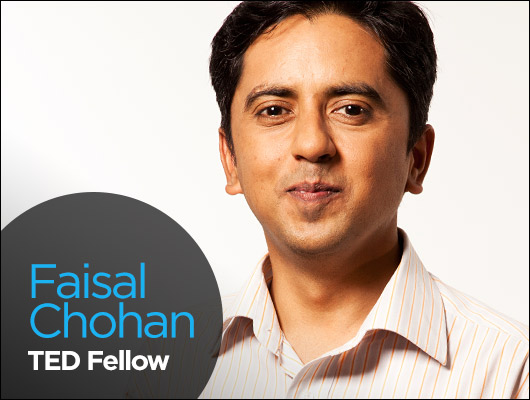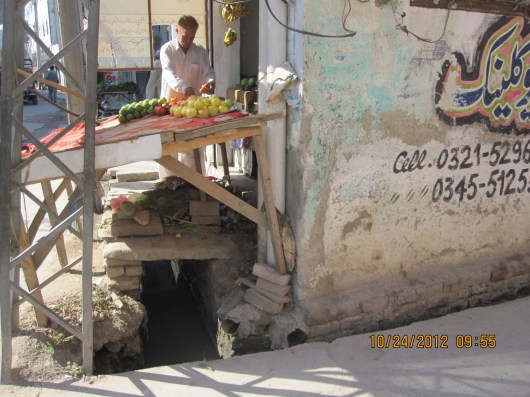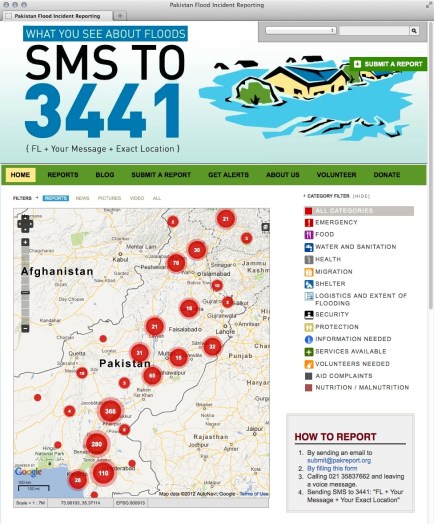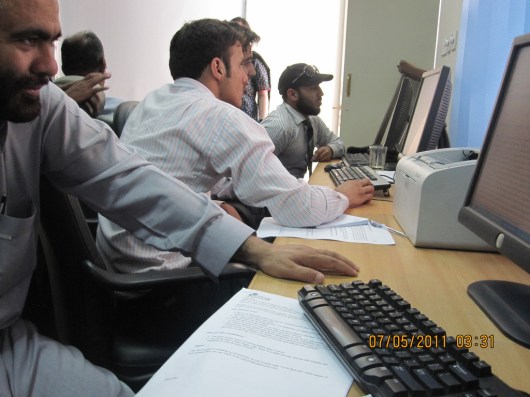Tell us about your City 2.0 project, Saaf Pindi. What problem does it seek to address, and how will this project work?
Lack of proper sewerage infrastructure and clean water results in water-borne diseases like cholera, that has become the second biggest killer of children in South Asia. More than half the Indian population defecated in the open in 2008. In Pakistan, only 18% of the population has access to the proper sewerage infrastructure. Governments do not spend money in improving sanitation, nor there is pressure from citizenry to improve this situation. In Pakistan, for example only .037% of the budget is spent on improving sanitation.
Urban infrastructure maps are the essential basis for any coherent infrastructure planning. Data and mapping is key in building, maintaining, upgrading and rebuilding the cities of today and future. At a time when Google and Apple are going to launch 3D maps for better navigation, more than half of the world lacks proper sanitation infrastructure. The worst part is that such an important issue is not highlighted in the online mapping space, with a few limited exceptions. Spotlighting these issues through online maps and open data is one way to work towards possible solutions.
The Saaf Pindi project is mapping the poor sewerage infrastructure in Rawalpindi, the fourth largest city in Pakistan, with a population of 5 million. Our maps will will show the on-the-ground situation through online maps, make the data open, and track progress and government spending on every street of the city. We are focusing on mapping open sanitation pathways and points where untreated sanitation waste is dumped into natural water channels, such as rivers and canals. Our aim is to improve the situation by involving the local community, and holding the government accountable by tracking progress. One base mapping is done, we’ll add layers to the map to review improvements, budget allocations and maintenance of sanitation facilities with the help of community involvement. Additional layers will map instances of waterborne diseases reported in hospitals, to show the relationship between sanitation and disease.
We’ve spent the last few months designing the project and doing on-ground mapping. We divided the city into eight parts and have completed mapping of one area. We’re now working on bringing our first on-ground maps online and building a visualization to show the poor sanitation situation. In the next stages, we plan to integrate citizen reporting into the platform. I don’t know what shape it will ultimately take — but our vision is to solve this problem in Pakistan and then scale it all over the world.
How did Pakreport start? What was its impact, and what has it evolved into today?
Pakreport — a crowdsourced disaster response platform implemented in response to the 2010 floods in Pakistan — would actually not have been created if it hadn’t been for the TED fellowship. I stumbled on TED.com from the Webby awards website, applied for the fellowship program, and became one of the selected Fellows in the first Fellows class in 2009. This gave me opportunity to meet, interact with and get inspiration from world leaders. The work of the other Fellows, in particular, inspired me a lot. It gave me courage to get things done that were hard to even conceive of before.
At the end of July 2010, we faced massive floods in Pakistan, which affected 20 million people. I set up the Pakreport website based on the Ushahidi platform. [Ushahidi allows users to crowdsource crisis information via mobile, and is the brainchild of Fellows Juliana Rotich and Erik Hersman]. Within hours, I had built up a team of more than 20 people from all over the world, most of whom had experience in deploying Ushahidi in Haiti after the earthquake.
Our first implementation was to provide real-time reports during floods in Pakistan, with time and location context from the information gathered through mobiles and other ICT tools. Pakistan has 61% mobile teledensity, and mobiles phones are important tools for connecting and communicating with people on ground, especially in disaster situations. The team at Pakreport set up a short SMS code, 3441, that was made available on four of the five mobile companies in Pakistan. It was a shared short code, so the “FL” tag needed to be appended before the message. We publicised the short code through the media — mainly radio — and relief agencies, with the message “what you see about floods.” The volunteer team working everywhere in the world used a crowdsourcing platform (CrowdFlower set up this plugin for us) to categorize the messages and, if geographic details were contained in the message, mark their location of origin on a map. We also mapped more than 300 villages that had never been mapped, and made all the data open. Our primary stakeholders were relief and first-responder agencies.
The Pakreport team worked more than 20 hours from more than seven time zones during the time of flooding. One team built documentation and training materials for for newly recruited volunteers. One team managed all technology infrastructure from USA. One team did volunteer training through Skype. One team managed all the media coverage. One team helped craft next steps on daily basis. I was running on the ground and coordinated all the team members from various time zones in real time.
Once we fell into love with mapping, we extended the platform to map and visualize hidden information and data. For example, when the election campaign started in Pakistan early this year we did a DoWeVote map to highlight low voter turnout. We also took data available on power generation and drew a power-generation capacity map of Pakistan by plotting each unit with its capacity. After a few hurdles, now this map is available to the public and provides everyone a clear picture of the power-generation capacity of Pakistan.
Pakreport.org has already set the foundation for Open Data in Pakistan. I believe that opening up government data is solution for fighting corruption, improving efficiency and accelerating innovation. My vision for Pakreport is to make it a platform for open and hidden data.
You were on the front lines of online entrepreneurship in Pakistan. Tell us about your path to becoming a young innovator with a social conscience.
I was a sensitive, introverted child. I grew up in the cantonment areas of Bahawalpur and Gujranwala, Pakistan, because my father was in the Pakistani army. I used to listen to the troubling news in the evenings on TV, and would think a lot about solving problems for others who lived thousand of miles away. These characteristics matured, and I grew up to have a problem-solving personality!
I always wanted to achieve something extraordinary in my life. I was curious about learning new things, more than my school could accommodate. I studied in the public school system in Pakistan, and there was no concept of skipping or advancing classes. Sometimes, my teachers allowed me to sit in in the higher grades for few days, but it was only temporary. My only other option was to learn through books, that were hard for me to understand in most cases. I studied accounting after college, but my main interest became technology, so I did my masters in computer science and began working in software development.
While I was working in the tech sector in Pakistan, a group of us started thinking about starting an online business. Thus we were forming one of the first young-entrepreneur-led tech companies in Pakistan. For our first product, we decided to build a jobs website to bring online recruitment model to Pakistan. We built the first version of the website in my living room at night after office hours and on weekends. I contributed to this first version, and then we scaled the product later.
We bootstrapped and launched BrightSpyre in August, 2002, with recruitment campaigns for our first few customers. Broadband internet was launched in Pakistan at the same time. However, 1.3 million users have access to internet through dial-up. We worked with customers all over Pakistan and outside Pakistan, automating their recruitment processes. At the same time, we provided a platform to job seekers to connect with opportunities quickly, along with providing awareness about career opportunities.
What was the response?
The initial feedback we got for our idea was that only the IT industry would ever adopt an online recruitment model, but eventually it became clear that online recruitment alleviated the pain of traditional hiring methods across industries. So HR departments and organizations with large-scale hiring needs became early adopters of online recruitment in Pakistan. We organized job fairs, startup and technology promotion events, trainings and competitions for young people in Pakistan, mostly at universities. We’ve helped more than 10,000 candidates find jobs, and to date, we have reached a talent pool of more than 1 million users in Pakistan. Despite people’s doubts, we persisted in believing in online recruitment model, and it paid off — it has now became a reality. But a lot needs to be done to build the Internet ecosystem in Pakistan, as has been done in the telecom sector.
Meanwhile, we worked on building our tech company, Cogilent, and promoting technology, and this is what we plan to continue doing. We want to create a large, lean company based on the Silicon Valley enterprise model in Pakistan. I believe that internet is the engine for distribution of opportunities, and any work or job can be distributed. This is why we launched ework.pk: we are trying to create work opportunities for people in Pakistan using existing and new models to make it possible to get any work done by anyone from anywhere in Pakistan – linking opportunities with skilled workers.
So far, Cogilent has been a success. One of our founders won the Shell young entrepreneur of the year award in 2004, and we were one of the finalists in MIT Business Acceleration Plan Pakistan chapter. We got global recognition through TED, and this led us to compete at global levels.
What are your biggest concerns for Pakistan, and how do these concerns inform your work?
Actually, Pakistan and other developing countries have huge potential to grow. It’s estimated that there are about 104 million Pakistanis below the age of 30, and if we give them the right opportunities, this can lead to a better world. But at the same time, there are many depressing and disturbing challenges. My work is all about taking these challenges and creating solutions to these problems using technology.
My biggest concern for Pakistan — and this generally stands true for most developing nations — is the limited access to opportunity coupled with issues that are taking too long to solve. By limited opportunities, I mean for quality education, employment and work. To solve these issues in Pakistan, we have to look at solving these issues outside our boundaries — and computers and mobiles have provided us the required reach and ability. The only barriers that exist in this approach are legal and tax-related. For example, in Pakistan, you cannot buy certain books on Amazon. You cannot listen to songs. You cannot access university lectures on iTunes. Many cite the example of no PayPal in certain countries, because the state banks are unable to understand how online payment models work. When I fly to the US and log in to the same service, I am same person with the same identity, but just sitting at a different location, from which I can access all these resources. What if these barriers started disappearing, as they have for quality education by MOOC — massive open online courses such as Udacity and Coursera?
Secondly, it has taken too long for these countries to solve basic problems like improved sanitation, garbage collection, clean water. We are now using the Pakreport platform to highlight these issues.
Finally, some things that are challenges in developed countries are far worse in developing countries. Public transportation, for example, is at its worst along with public health care systems. Just to give you an example, waterborne diseases are the second biggest cause of death in South Asia. Water treatment technologies have existed for decades now. As a global community, we need to figure out a way to spread the benefits of these technologies at the last mile.




Comments (2)
Pingback: TED Fellow organizes blood donations for victims of the Peshawar tragedy | TEDFellows Blog
Pingback: Blog of year award for TED and a blog about s—t « living in gratitude